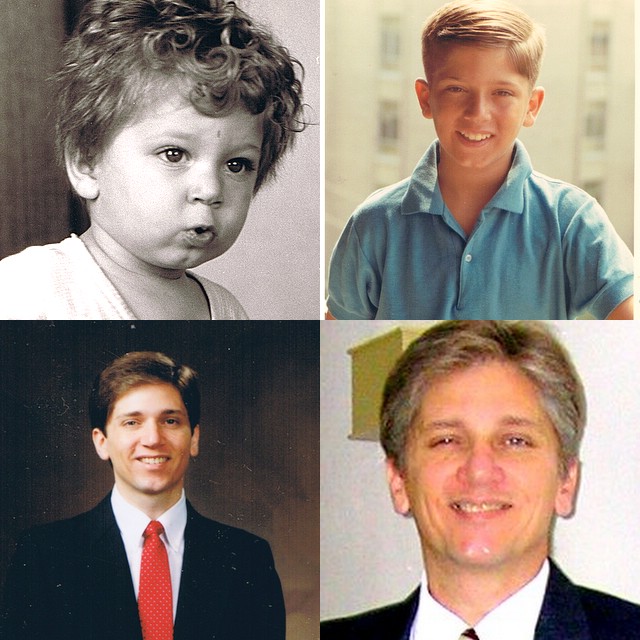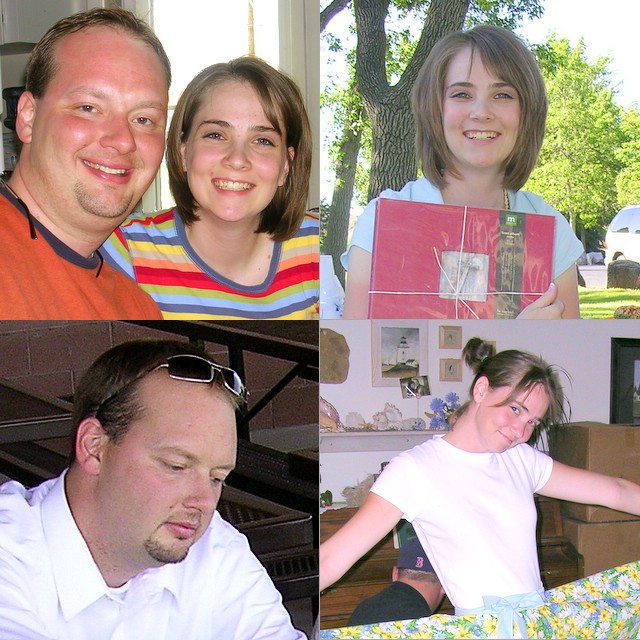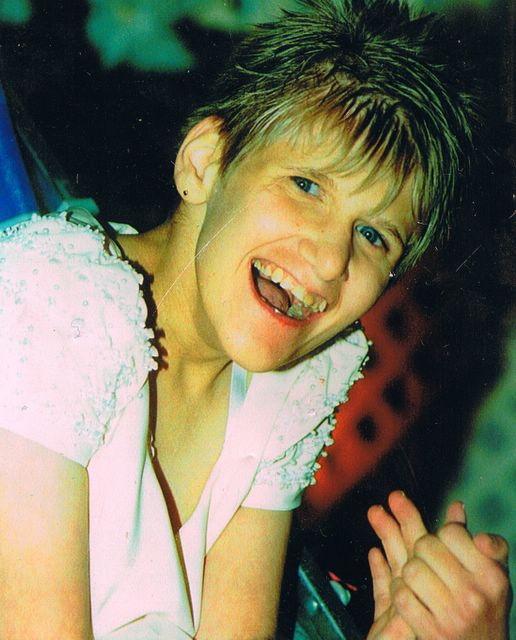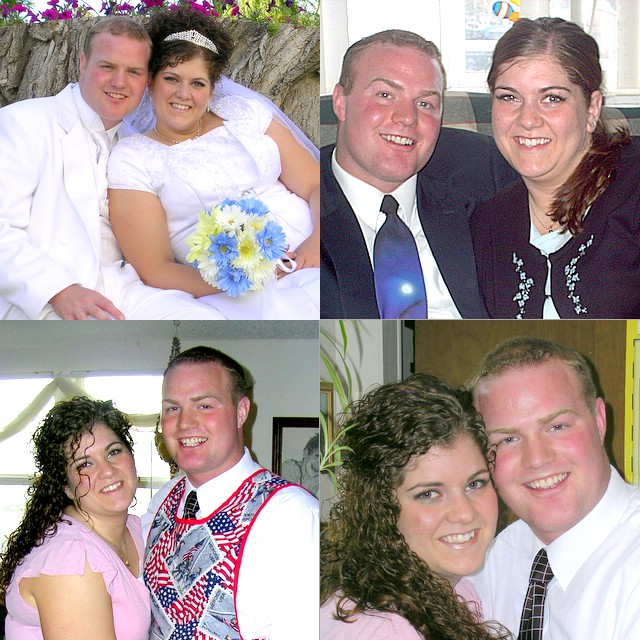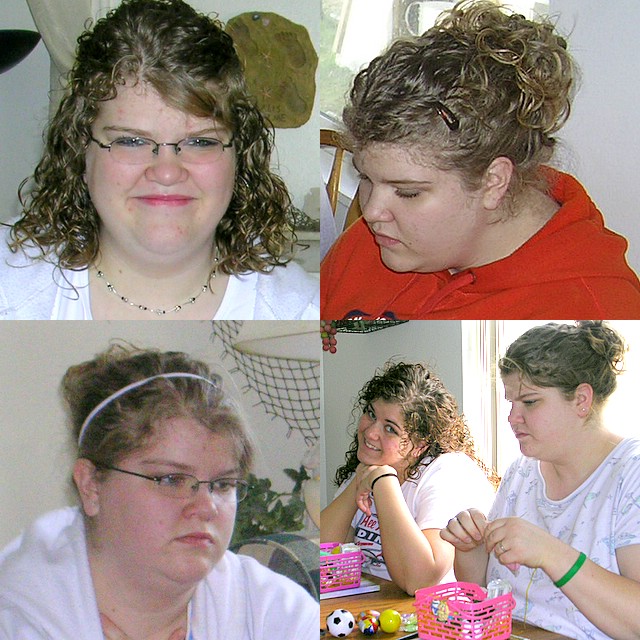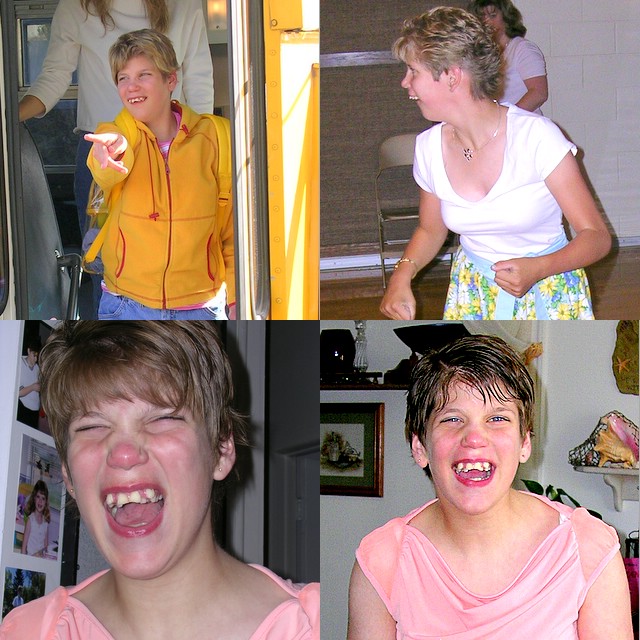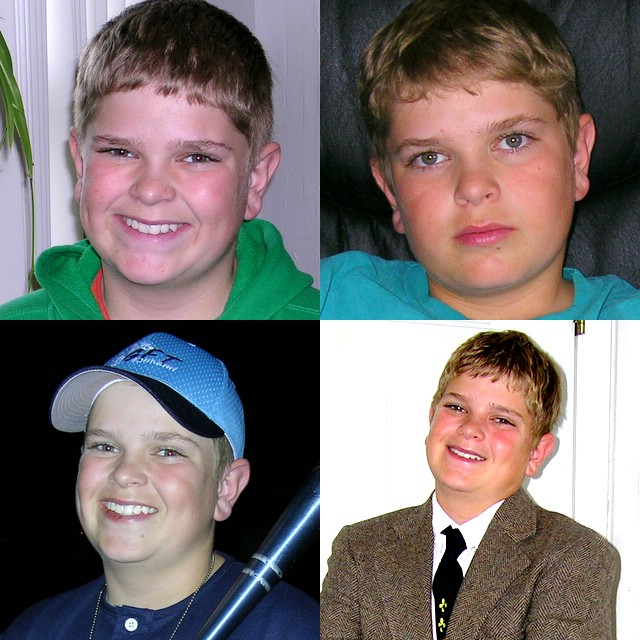I WAS A HURRICANE HUNTER! (WELL, SORT OF)
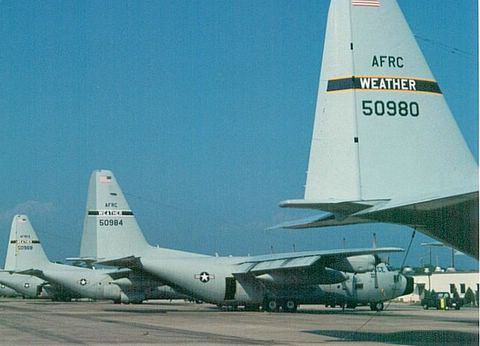 [April 30th] -- The fall of 1977 was a very difficult time for me. I lived in Washington, D.C., and still suffered from post-Watergate trauma. I was going to college to become something I didn't want to be, and felt depressed about the general direction the country was headed. One day, out of the blue, I walked into an Air Force recruiting office near 7-corners and joined up.
[April 30th] -- The fall of 1977 was a very difficult time for me. I lived in Washington, D.C., and still suffered from post-Watergate trauma. I was going to college to become something I didn't want to be, and felt depressed about the general direction the country was headed. One day, out of the blue, I walked into an Air Force recruiting office near 7-corners and joined up.
Just like that.
Two months later, I was standing in the January cold of San Antonio, Texas, at Lackland Air Force Base. Well, me and fifty other guys. We waited for our drill instructor to arrive. For an hour. He made us wait in the dark, in the cold, hungry and shivering. We knew he was boss from the first moment we saw him. He had a bulldog face and the growled when he talked. That said, Air Force basic training wasn't all that bad. We ran a mile. Once. We fired an M-16. Once. The rest of the time was spent in the classrooms under the dorms where we learned how to be members of the U.S. Air Force. I have nothing but good memories during my time at the 3703 BTMS.
Back then, the Air Force began a new policy that allowed you to lock in a career before leaving for basic training. However, I wanted to be a broadcaster for the Armed Forces Radio & Television Network, which required a test during basic. That forced me to join in the "open" category, which meant the Air Force could turn me into anything they wanted if I didn't pass my test.
I was nervous when I got the word to report to such-and-such a building for my test. It was an open office 20 X 30 feet, with small cubicles around the outer walls. A bank of windows along the far wall kept the room bright and cheery (at least using Air Force standards). There was a microphone in each of the booths, which were lined with those old asbestos tiles caused cancer. A nice-enough tech sergeant gave me a fake newscast to read. He put me in front of the mic, and said 'go.' I went. "This is Air Force Airman Basic Farid Rushdi with today's AFRTS news!" I began. When I finished, I asked the sarge how I did. Good he said. Want to try one more time? I did. Remember, this is 1978. We're not talking "high tech" here. He took the tooth pick out of his mouth and placed it in one of the rings of the reel-to-reel tape recorder and backed the tape up to that point. That's the best he could do -- no "record over" capability. Off I went again. I eventually did a third take. "That's good enough to get you in" he said with a smile. A couple of weeks later, the drill instructor brought us our first "orders." I was so excited, I couldn't stand still. Until I got my orders. I was being sent to guard a missile silo in North Dakota. Later that day, I met with a sympathetic personnel officer who told me what happened. "You got beat out by a black woman" he said. "That's five extra points for being a woman, and five extra points for being black. She beat you by four points."
Crap.
He asked me what I'd like to do in the Air Force, and, angrily, I said "The job that requires the least amount of work." "Fine!" he said. "Your'e now a 70230" "Huh?" I asked? "You know, like Radar O'Reilly!" An administrative assistant. Cool. That worked for me.
After basic ended, they boarded 80 or so of us unto a Greyhound bus for the long ride to Biloxi, Mississippi, home of Keesler Air Force Base. It was there that I learned how to be a "house mouse," a real demon on the typewriter. I really enjoyed it. Towards the end of training, orders began appearing for all of us in the training facility. Everyone except me. Figures. After I was the only one left without orders for my first tour of duty, I rode the base bus over to the CBPO [I can't remember what it means any more, but it was the personnel office] and asked the guy behind the computer if he could tell me anything. He punched a few buttons and said, "Okinawa!" "Where's that?" I asked. "Hell if I know" was his reply. Of course, I found out that Okinawa was a small island at the very end of Ryuku chain, the southern most part of Japan. I was to be part of the 6077th Security Squadron, whatever that was.
Well, what that was was turned out to be a bunch of Russian-speaking guys who flew to the Soviet border and "eaves-dropped." Spying, basically. I was told to go see "this other guy" and get my security paperwork started. Turns out to work in that organization, you had to have an "SCI" clearance, which was above "top secret." He pulled out a bunch of papers and began asking questions. "Place of birth?" "Beirut Lebanon." Where was your father born?" "Palestine." Where were your brothers born?" They were all born in the Middle East. He kind of furled his brow. "What about your sister?" "She lives in Jordan." On and on it went. He finally asked me if someone had put me up to "all this," because there was "no way" a guy with my background could get an SCI clearance. He finally filled out the paperwork and told me to return to my unit until I heard from him. He couldn't promise when that might be. "Gotta ask the boss what to do with you" he said.
Several days later, all the guys in my flight took off for their first billets. I was transferred to an old WWII barracks where guys who were in the middle of "coming and going" stayed. Finally, someone came by and said, "report to the "'Hunters." Until they could figure out what to do with me, they decided to put me to work.
The "'Hunters" turned out to be the famed "Hurricane Hunters," known world-wide for flying into the eyes of hurricanes to research their ways, and then hopefully develop a system of prediction and warning. I was surprised at their offices. They occupied part of a very long cinder-block building that was just twenty or so feet from their planes that silently waited on the tarmac. Their was a long, plain hallway with several offices that opened on either side. All the walls were a pale yellow and the entire area was windowless, giving the work environment that floresecent green feel. If you look at the picture above, you can see the door along that yellow building that leads to the airplanes. My office was about twenty feet inside that door and to the left.
After a few days, one of the pilots invited me onto the tarmac and into one of the planes. He took an hour of his valuable time and explained the various equipment, why they use that particular plane, and even said he'd take me up the next time he flew. This was soooo cool for a kid of 22.
I had been with the 'Hunters for about a month, and we were beginning to get into hurricane season. I was ready for that flight. Then, I got a call. It was "that guy" at the personnel office. "I'm tired of them telling me not to send you, so before they tell me again, you're on a plane tomorrow for Okinawa. Be ready."
That was that. I never flew into a hurricane. I took a bus to New Mexico to visit a friend, then flew in a small plane to Los Angeles. From their, I flew in an old Ford Tri-Motor (Yes, from the 1930's!) to San Bernadino, where I would board Flying Tigers Airways to Okinawa via Anchorage and Yokota, Japan. When I arrived on the small island, I reported to my new squadron. "Why did they send you?" they asked, "we can't get you a clearance."
I ended up being Major Meyer's Radar O'Reilly, doing all the typing and filing and "stuff" that he wanted done. My office was just down the hall from my room. I didn't go to the "secret" building and didn't need the clearance. Don't get me wrong, spying on the Russians during the Cold War was pretty exciting stuff, but I really wanted to fly, just once, with the Hurricane Hunters.
I'm probably too old for that flight today.
(Sigh...)
Culture Shock!
 [March 11th] -- There were many things that took some getting used to when my family came to the United States in 1959. Beirut was certainly a modern city when compared to other regions in the Middle East, but it was virtually stone-age when compared to Washington, D.C. One of the things that amazed me the most was the size and the glitz of American cars.
[March 11th] -- There were many things that took some getting used to when my family came to the United States in 1959. Beirut was certainly a modern city when compared to other regions in the Middle East, but it was virtually stone-age when compared to Washington, D.C. One of the things that amazed me the most was the size and the glitz of American cars.
Most of the cars in Beirut were Fiats, made in Italy, and easily transported by ship across the Mediterranean Sea. Fiat's were very simple, without any chrome, and, because of the war's effect on Italy's infrastructure, several years behind the other car makers of the world. My father owned a small Fiat similar to the one pictured here. He once told me that he had run out of gasoline, and poured a can of lighter fluid into the tank. He got to the gas station. As I remember, the car worked often, but not all of the time. More than once, we all piled into the family Fiat for a Sunday trip to a friend's house, and ended up having to walk because the car wouldn't start. Of course, there was no heater or radio.
You can imagine, then, my astonishment when my father drove up to our house in a baby-blue 1952 Buick Special. It was huge.  I had to squint because of the reflection coming off that oversized chrome grille. It had everything. A radio, a heater; why, it even had an automatic transmission! When we rolled up the windows and took off down the road, I couldn't hear any outside noise. Even the richest of Lebanese had nothing like this car. Although it was six years old, it was in perfect shape.
I had to squint because of the reflection coming off that oversized chrome grille. It had everything. A radio, a heater; why, it even had an automatic transmission! When we rolled up the windows and took off down the road, I couldn't hear any outside noise. Even the richest of Lebanese had nothing like this car. Although it was six years old, it was in perfect shape.
Today, I realize that car was a symbol of the greatness of the American economy. In Beirut, people made purchases based on needs, not wants. Money was hard to come buy in the Middle East, and every pound sterling spent went to fulfilling our family's necessities. In America, everything was bigger and better. Here, purchases made you happy. There, purchases kept you alive.
Thanks Dad, for bringing us to this great country. Now, if they could just bring back tail-fins.....
Munson Hill Memories (And They 'Aint Good)
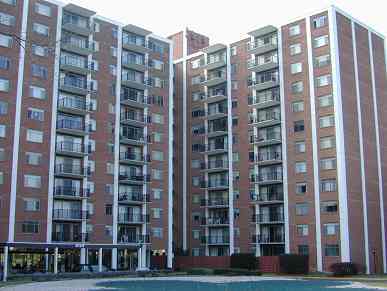 [February 5th] -- I never did anything incredibly stupid as a kid. But I came oh so close ....
[February 5th] -- I never did anything incredibly stupid as a kid. But I came oh so close ....
I lived in the Lake Barcroft Apartments from 1968 through 1971. It was a sprawling complex that consisted of dozens of six-story buildings that were crammed into a small silouette of land between Leesburg Pike and the back fence of J.E.B Stuart High School. The apartments were decidedly middle class, inexpensive enough for truck drivers yet nice enough for mid-range government workers. It was a pleasant place to grow up.
Neighboring Munson Hill Towers was as oppulant as Lake Barcroft was simple. Although they both shared a common property line, the two complexes might as well have been in different countries. Munson Hill was for the upper-crust, housing a combination of rich retired types and high level government officials. It featured tennis courts and a two-hole golf course. In the front of the building was a beautiful three-story fountain that created a soft mist which gave the building an eerie appearance in the early morning. It was the fountain that almost got me in soooooo much trouble.
Our school bus picked us up and dropped us off just a few feet away from the fountain. I had joked to one of my fellow 7th graders that it would be "cool" to pour a few boxes of laundry detergent into the fountain and create a wall of foam like I saw on the Brady Bunch the previous night. My friends loved the idea.
I was kidding. They were serious.
By the end of the school year, Brooks and David were ready to "attack" the fountain, and they wanted me involved. I refused. Oh, I tried to come up with some "cool" reasons as to why I couldn't, but the fact is I just didn't go for that kind of thing. They finally gave up on me and made their plans for the "attack on Munson Hill." They both snuck out after their parents went to sleep and crossed the golf links towards the fountain. They carried ten boxes of Tide detergent. Around midnight, they made their move. It took them about five minutes to empty the boxes of detergent into the fountain. Brooks told me later that as they ran, he glanced back over his shoulder and saw the foam already beginning to overflow the fountain wall.
The next morning, I walked to the bus stop and found literally dozens of work trucks surrounding the fountain. There were three police cars as well. They were so busy running around the fountain that they never noticed us waiting for the bus. Brooks and Dave were in hysterics.
The police were waiting for us when the bus made its afternoon stop. They somehow knew that someone in the group was responsible, but weren't able to force anyone to admit it. I thought that my two friends were dead for sure. That night, detectives canvassed the entire apartment complex looking for anyone who might have seen someone walking towards Munson Hill the previous night. They came to our door too. They asked my father who said that, no, he was asleep and didn't see anything. He asked the police why they were so interested in a "prank" that did no real damage. I was shocked when I heard the reply. "It wasn't just a prank," began the policeman, "Munson Hill's air conditioning system cools itself using water from that fountain. When the pumps brought in that soapy water, it destroyed tens of thousands of dollars of equipment." As the policeman was walking away, he turned and said, "What's worse is that they won't have their air conditioning for weeks, maybe months." It was two weeks before the July heat and humidity was to hit. Most of the windows were could not be opened as the building was built around the air conditioning system.
They never found out who did the damage, and I never felt the need to tell. Although my two friends still laughed about what they had done publicly, privately, I have little doubt that they were very troubled by their actions.
And I came so close to being part of it.
My Favorite Little Corner Of Washington D.C.
 [January 28th] - I'm often asked by my Idaho neighbors what part of my suburban Washington neighborhood did I miss most.
[January 28th] - I'm often asked by my Idaho neighbors what part of my suburban Washington neighborhood did I miss most.
My answer is always the same. I miss the part where the Washington "poor" lived.
This is a photo of the Culmore Shopping Center, just a mile or so north of Bailey's Crossroad, and a mile or so south of Seven Corners. It was a middle class neighborhood, perhaps just a tinch below middle class. Behind the shopping center was an endless maze of tiny two-story brick apartments, built in the early 1940's to handle the influx of war workers into the the area. By 1972, when this image was taken, the residents were working class families just trying to make it to their next paycheck. In the distance were Skyline Towers, high-rise, high-income apartments that supplanted the local piper-cub airport. They were just steel and concrete skeletons at this point. Behind me (I was the photographer), Leesburg Pike began to climb until it reached Seven Corners at the top of the hill. With the exception of a small patch of those same WWII brick apartments, Seven Corners was an upper-income area as well, with stores such as Lord and Taylors and Woodward and Lothrops dotting the landscape.
I spent most of my time in and around this region in between the "money" areas of Falls Church. The people were nice, average and carried no aires about them. They were truck drivers and cement workers and assistant managers, people with little money but a lot of decency. Their cars were older and their clothing simple, but they were fun to be around.
My high school (J.E.B. Stuart) was a mix of the very rich and the very middle-class, and social cliques were stratified and almost impossible to join if you didn't "belong." Although I lived in an apartment building that was home to one senator and three congressman, I tended to hang out with friends who lived in and around Culmore.
Today, I'm sure that this part of my old neighborhood has been rebuilt and revitalized and the middle-class can no longer afford to live there. And that's sad, because from this financially struggling part of suburban Washington came many great and important people, high school friends who are today doctors, lawyers, career politicians and members of the military. They proved that you didn't have to have a great deal to become a great person.
It's Back To The Books Tomorrow
 [January 8th] -- I haven't worked since shortly after the 9/11 attack. Oh, I haven't been sick or anything. It's been by design. I had been pondering a return to school for several months prior to the September 11th tragedy, and I guess the attacks made me realize how fleeting life is. I decided to follow my dream before I joined the list of those who died having not enjoyed life to its fullest.
[January 8th] -- I haven't worked since shortly after the 9/11 attack. Oh, I haven't been sick or anything. It's been by design. I had been pondering a return to school for several months prior to the September 11th tragedy, and I guess the attacks made me realize how fleeting life is. I decided to follow my dream before I joined the list of those who died having not enjoyed life to its fullest.
I have been attending Idaho State University since January 2002. It's been a great experience. Unlike many colleges and universities today, there is no liberal bias here on the Pocatello campus. Oh sure, the great majority of my professors are liberals right out of the '60s, and they enjoy rattling the cages of their mostly conservative, Republican students (hey, this is Idaho remember). But these professors allow for differing views. They judge the students on their ability and not their politics. I have enjoyed hearing from the "other side" in a forum other than "screech radio."
I should have graduated this spring, but my daughter's death two years ago forced me into a dark place that took me too long to break out of. I've lost two full semes ters sitting at my desk and staring out the window, allowing at first hours, then days, and finally weeks to pass without regaining consciousness. I'm better now, however, and I'm ready to rejoin the real world.
ters sitting at my desk and staring out the window, allowing at first hours, then days, and finally weeks to pass without regaining consciousness. I'm better now, however, and I'm ready to rejoin the real world.
I'm going to be a high school history teacher, something I've always wanted to do but was constantly talked out of by both family and friends. I'll begin my teaching career at the age of 50, earning the grand sum of $27,500 per year. I haven't earned under $30,000 a year since the mid 1980's. But you know, money means nothing. There were times I was making $60,000 + per year, and would wake up at 4:00 in the morning in a cold sweat, unable to handle the idea of going to work that day. I'll be poor, but I'll be happy.
So, tomorrow I have a math and an economics class. I hate math and I despise economics. And I can't wait to get started.
Beirut Lebanon: Beautiful Then, And Again
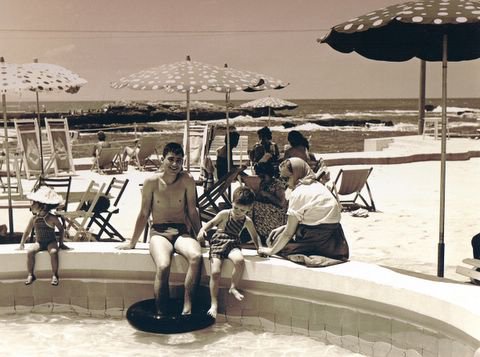 [October 30th] -- Many friends and acquaintances who know that I come from the Middle East always assume that I came to the United States because of the "backward nature" of the region. Oh, if they only knew.
[October 30th] -- Many friends and acquaintances who know that I come from the Middle East always assume that I came to the United States because of the "backward nature" of the region. Oh, if they only knew.
This is a photo of my mother, my brother Nabil and me [I'm the cute little tyke] enjoying ourselves on "Long Beach" in Beirut, Lebanon. My father took the picture in 1959. The beach was every bit as modern and "up to date" as any of the American beaches of the era. Notice that there isn't a single person wearing traditional Arab clothing. This was a time before Islamic fundamentalism took hold throughout the region. In addition, Beirut was a melting pot of cultures; there was no "right" or "wrong" religion, color or background. This "communal community" concept was long forgotten by the 1970's when Beirut was ravaged by a destructive and debilitating civil war. Slowly, Lebanon is beginning to revert back to its roots of openness and inclusiveness.
But, it's going to take some time yet.
Living In Florida Had It's Ups & Downs
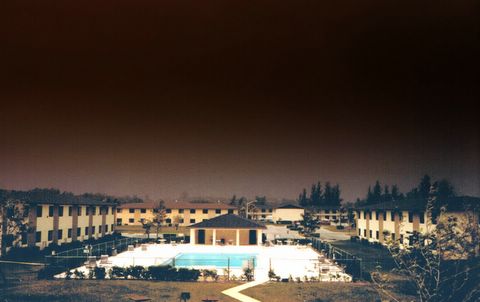 [October 25th] -- When you look out your living room window during a January blizzard, the "sun and fun" of Florida's warm-weather winters can seem very appealing. To me, Florida was a "nice place to visit, but I sure wouldn't want to live there [again].
[October 25th] -- When you look out your living room window during a January blizzard, the "sun and fun" of Florida's warm-weather winters can seem very appealing. To me, Florida was a "nice place to visit, but I sure wouldn't want to live there [again].
A new job took my family from St. Louis to West Palm Beach Florida in 1985. At first, it was really fun. Christmas day at the beach was amazing. We were always taking trips to explore all of the "family fun" that Florida had to offer. Disney World. Sea World. Busch Gardens. The list was almost endless. The fun continued until the warm and dry spring morphed into the hot and humid summer. We stopped traveling. We stayed in the house and tried to remain cool. We had just begun to get used to the heat when we 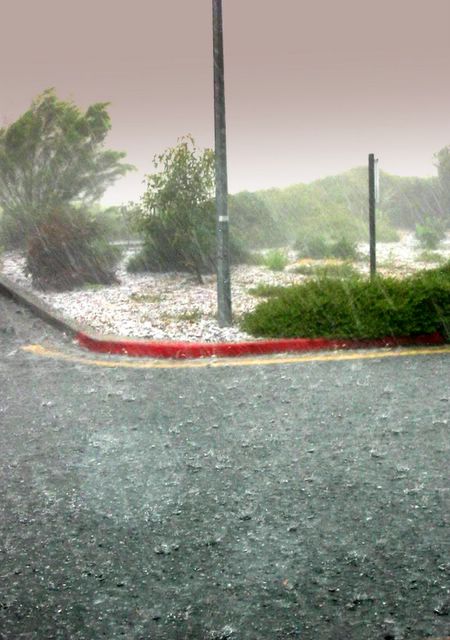 were introduced to the cycle of daily afternoon rainstorms.
were introduced to the cycle of daily afternoon rainstorms.
These weren't really rain storms; they were more like mini-hurricanes. Every afternoon at 5:00 p.m., the skies would darken and the air would become dense with moisture.
By 5:30 it would start to pour. The rain would come down with such force that it would sting and leave red marks on the skin. At 6:00, the sun would reappear and the two inches of water left on the roads would vaporize into steam. That sticky, humid, vaporized water would remain in the air until early the next afternoon, when the cycle would repeat itself.
Oh yes. Florida had a lot of wonderful things to see during the summertime. And we saw them. From our television set. And then we waited. Until winter, that is. When we could come out of the house without having to deal with the sauna that is Florida in the summer.
Weighty Issues
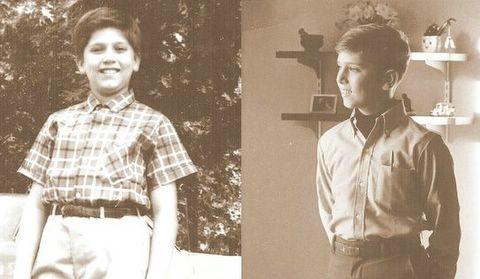 [October 24th] -- These two photographs of me were taken on my birthday one year apart. The image on the left was taken in 1967, at the age of 11. The one on the right was taken on my 12th birthday one year later. In 12 months, I went from pudgy and portly to slim and svelte. I didn't lose the weight on purpose. There was no diet or exercise regimen in place. I just stopped eating.
[October 24th] -- These two photographs of me were taken on my birthday one year apart. The image on the left was taken in 1967, at the age of 11. The one on the right was taken on my 12th birthday one year later. In 12 months, I went from pudgy and portly to slim and svelte. I didn't lose the weight on purpose. There was no diet or exercise regimen in place. I just stopped eating.
My mother was diagnosed as having the flue in early February, 1967. She became so ill that her doctor admitted her into the hospital for a few days of rest and recuperation. She died three days later when a blood clot broke off in her leg and lodged in her lungs. She leaped out of her bed and whispered, "Tell Rasem [my Dad] and the kids I love them" and fell onto the bed dead. Her death took away from me the will to live. Oh, I wouldn't have killed myself, but neither did I have any desire to interact with life. I stopped eating. I stopped playing with my friends. I sat in front of the television set all day and thought of my mother.
In mid 1968, my father moved us from the house I grew up in into a modern, high rise apartment. My dad bought some new furniture and got me some new clothes, and finally, a year after her death, I began to recognize the world around me again.
Although the sharp, hopeless pain has long since faded, I still miss my mom today. She was a very special person who guided me through love and compassion rather than the anger that so many parent's use. She was 40 when she died, and I, at 49, feel so very guilty that I have outlived her.
I love you Mom.
My, How Kids Have Changed ...
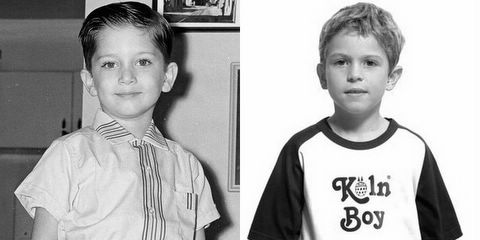 [October 23rd] -- The picture on the left is me at age five, in 1961. The image on the right is a typical 5 year-old today. Times, they are a changing.
[October 23rd] -- The picture on the left is me at age five, in 1961. The image on the right is a typical 5 year-old today. Times, they are a changing.
Getting ready for school was much harder a generation ago. I had to wet down my hair and slick it back. The "do" wasn't just hygiene, it was a work of art. All of my clothes had to be ironed. No really, I mean ALL my clothes. My t-shirt, my underwear, even my socks had to look "just so." Then, it was down the stairs where my Dad took a close look to make sure that I was someone he could be proud of. Throughout the day, at school, on the bus, at the baby sitters, adults made sure that we clean and presentable. At night, I began the process of getting ready for the next day.
Today, kids wake up 10 minutes before they have to be out the door, pick out their clothes from the pile on the floor that looks the cleanest, and shuffles out the door. The authority figures they come in contact with during the day, teachers, principals, bus drivers, can't intervene when the child's clothes are inappropriate. The parents have that authority, but are too busy, or self-absorbed to care.
I must say that I didn't much care for all the scrutiny growing up. Clean this. Fix that. Go there. Eat this. But in retrospect, it was well worth it. I was taught respect and self esteem. Today, I care how I look when I go out in public. I care about others. I value rules. This all came from my father demanding from the best I had. The kids today who never comb their hair, who wear clothes that are unkempt and dirty don't have a great deal of self-worth. They've been taught that.
Hey Dad, I guess you were right.
The Right Side Of The Road Is Wrong? What?
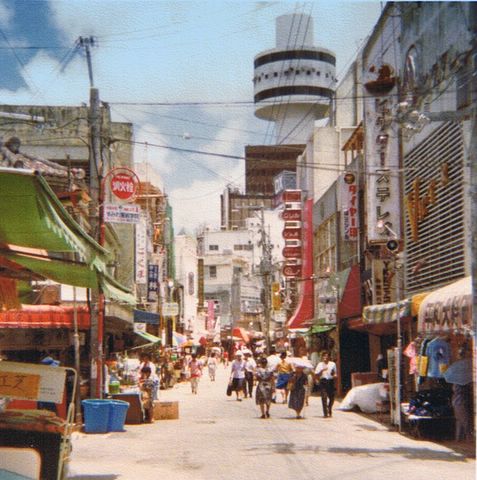 [October 18th] -- I joined the Air Force in 1978 to get away from Washington D.C. as much as I did to see the world. After three months of basic training at Lackland Air Force Base, Texas, I was assigned to a technical training squadron at Keesler Air Force Base near Biloxi Mississippi. My job was to be an "administrative assistant," a Radar O'Reilly for the squadron commander.
[October 18th] -- I joined the Air Force in 1978 to get away from Washington D.C. as much as I did to see the world. After three months of basic training at Lackland Air Force Base, Texas, I was assigned to a technical training squadron at Keesler Air Force Base near Biloxi Mississippi. My job was to be an "administrative assistant," a Radar O'Reilly for the squadron commander.
I graduated in the top 10% of my class, which provide me with several perks. My favorite was the "initial assignment guarantee," which let me choose my first station. "Where do you want to go?" asked the personnel specialist?" I thought for a moment and replied, "Anywhere that has right-side drive." I was happy to serve my country where ever they wanted me, but the thought of driving on the left side of the road scared me to death.
Three weeks later, my orders came: Kadena Air Base in Okinawa Japan. "Hey, wait a second," I began, "I was guaranteed right side drive!" The person in charged chuckled and told me to relax, that the Island of Okinawa, though part of the Ryukyu chain, was in fact right side drive. Cool. I arrived at Kadena a month later, and sure enough, the guy was right: RIGHT SIDE DRIVE.
After exploring Naha City for a few days, I began to see a logo on just about anything and everything governmental. It showed a two-lane road way with an arrow that moved from the right side to the left side of the road. There was a date of "7/30" as well.
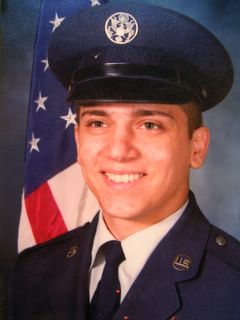 I asked a friend one day what it meant. I was stunned by his reply. "Oh, the U.S. is giving the island back to the Japanese on July 30th, and when they do, we have to start driving on the left side of the road."
I asked a friend one day what it meant. I was stunned by his reply. "Oh, the U.S. is giving the island back to the Japanese on July 30th, and when they do, we have to start driving on the left side of the road."
Unbelievable.
The week before the changeover, police from the main island of Japan began to arrive on the island. They covered all the street signs with canvas sacks. At midnight on July 30, the police stopped all road traffic throughout the island. Workers then began the process of turning the street signs the other way. By sunrise, they took off the sign covers. At 6:00 a.m., cars began to drive on the left side of the road. Now, this would have been difficult enough, but a small typhoon hit the island that same day. Cars were trying to drive on the "wrong side" while fighting 60 m.p.h. winds.
Unbelievable.
Over the next four months, new traffic lights were installed. Slowly, as the Japanese got used to the new system, the police were withdrawn and sent back to the mainland. Today, I doubt very many people remember much of that day. I sure do, though.
Unbelievable.
Another Redskin Sunday
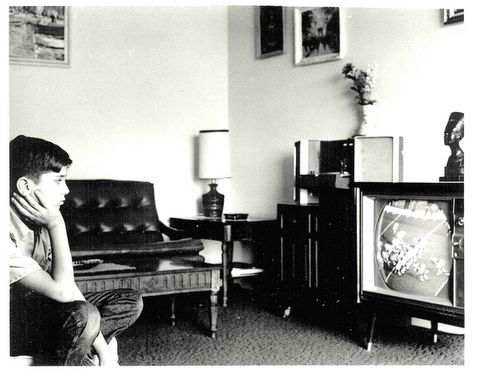 [October 13th] -- One of the nice things about having a father who was a top-notch photographer was having a great many quality pictures of yourself to look back on years later. One of the drawbacks, however was being staged so that the pictures "looked better."
[October 13th] -- One of the nice things about having a father who was a top-notch photographer was having a great many quality pictures of yourself to look back on years later. One of the drawbacks, however was being staged so that the pictures "looked better."
This picture was taken December, 1969, in our apartment in Falls Church, Virginia. I was watching the Redskins - Vikings football game and my father was "playing" with his cameras, changing lenses, clicking the shutter, and generally being bored. I was, as always, laying on the floor and watching the game, wearing a ratty t-shirt and my gym shorts. My dad, seeing a good picture possibility, had me put on my school clothes, comb my hair, and sit on the hassock. It took him about 15 minutes to set it up to where he liked the shot. *SNAP* -- and he was done. I missed most of the 3rd quarter -- luckily, the Redskins prevailed and I was able to enjoy the rest of the day.
Gee, I Don't Remember that Chair Being So Ugly
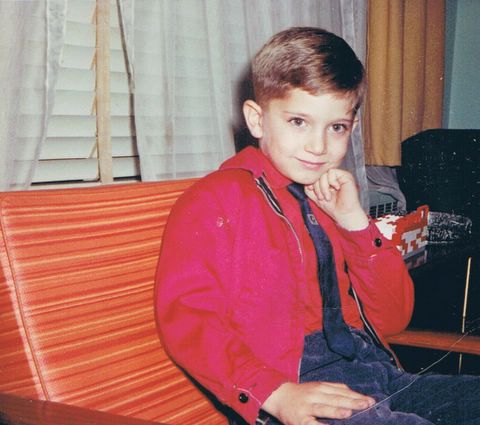 [October 12th] -- This picture of me was taken on Christmas Eve, 1962 -- I was six at the time -- in Alexandria, Virginia, just a "stones throw" from Washington, D.C.
[October 12th] -- This picture of me was taken on Christmas Eve, 1962 -- I was six at the time -- in Alexandria, Virginia, just a "stones throw" from Washington, D.C.
How different life was then. In our home, we had one phone [black, rotor-dial of course], one television [black & white] with four channels. There were no blacks or hispanics in my neighborhood, nor in my school. None of my friend's moms worked outside of the house, and they really did wear dresses and aprons when they worked around the house. All the dad's came home at the same time. President John Kennedy would live for another year. The "Cuban Missile Crisis" ended just two months before my dad took this picture. The flag at George Mason School still had 48 stars.
There is much about this time in our country's history that I don't miss -- the racism, the segregation, and the incessant clouds of tobbaco smoke that engulfed everyone's homes [I didn't know even one parent who didn't smoke]. I do miss, however, the innocence, the feel of familial closeness, the "aw shucks" and "gosh darn" way of talking. No "Simpsons" or "Law & Order: SVU." It was "Leave It To Beaver" and "Perry Mason."
I don't want to go back to the early 60's and re-live my youth, but there are times that I wish that parts of that era remained with me today.
Coming To America
 [October 10th] -- Have you ever wondered what it must have been like to be among the tens of millions who began a new life in the United States, who traveled across the Atlantic on ships headed for New York, waiting in unbridled excitement for that first glimpse of "Lady Liberty?"
[October 10th] -- Have you ever wondered what it must have been like to be among the tens of millions who began a new life in the United States, who traveled across the Atlantic on ships headed for New York, waiting in unbridled excitement for that first glimpse of "Lady Liberty?"
I am lucky to be able to say, "been there, done that."
My family was living in Beirut in 1959 when my parents decided to bring us to the United States. My father was born in Palestine and raised in the Middle East, my Mother was an American working overseas. Although both of my parents loved the region, both felt that our long term safety was better served in America.
We left Beirut and traveled to Athens on the Medina, a small ship that used to be part of the German navy during World War II. We stayed there for a few days before boarding a large ocean liner for our trip to New York, the "Queen Fredrika." I am the young boy in the picture [my brother Tim and my dad are also shown] so I don't remember a great deal about the trip. I do remember the gray and stormy October weather that buffeted the large ship. The weather turned calm a day out of New York, and we spent a great deal of time on the decks of the ship. We arrived in New York mid-morning. People started pointing at a tiny black dot as we grew closer to the city. Soon, the "dot" grew into the Statue of Liberty. Many of those on the deck pulled out small American flags and waved them as the drew near the dock.
It took a great deal of time to navigate through the harbor to the dock. Once there, many of the ship were herded down a ramp into a building while we went through customs. Once processed, New York City was ours. Because my mother was American, all of us were treated as returning citizens to the United States. I wish I had a great story to tell about Ellis Island, but it never became part of our "coming to America" story.
I love this country and all it stands for. I appreciate my roots and the values that I brought here from the Middle East, but I am grateful that my parents made this choice for me when I was young. Thanks, Mom. Thanks, Dad. I owe you.
The Day The Skyline Shook
 [July 25th] - The Skyline Apartments in Northern Virginia is today one of the most attractive complexes that were built in the mid 1970's. It has been renovated several times to keep up with the times, and provides a warm and attractive place to live.
[July 25th] - The Skyline Apartments in Northern Virginia is today one of the most attractive complexes that were built in the mid 1970's. It has been renovated several times to keep up with the times, and provides a warm and attractive place to live.
I doubt that many people know today that one of its buildings collapsed, killing several workers.
The construction of the Skyline Towers began in the early 1970's. The site was just north of Bailey's Crossroads in Northern Virginia, near what we called the "Piper cub airport." I lived on the 7th floor of the Woodlake Towers Apartments, and once the building's construction reached the third floor, I could see the towers grow from our balcony. By my senior year, 1974, the skeleton for the first building had just about reached its apex. Although the buildings began to loom over the area, we didn't give them much thought.
That is, until "that" day.
I was riding school bus #724 home from J.E.B. Stuart High School when a police car whizzed by, siren on, very unusual in Fairfax County. Within a few moments, another squad car shot past the bus heading down Columbia Pike towards Bailey's Crossroads.
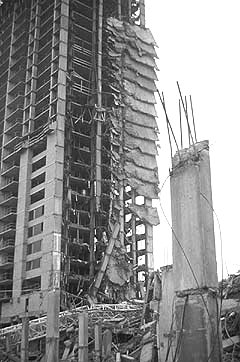 Suddenly, the local fire company blared its siren and its fire engines and emergency vehicles shot in the same direction. We knew something was happening, but we weren't sure what.
Suddenly, the local fire company blared its siren and its fire engines and emergency vehicles shot in the same direction. We knew something was happening, but we weren't sure what.
I entered my apartment, turned on WTTG channel 5 and made my favorite post school-day snack, a cheese sandwich with sesame crust bread. I lounged on the couch for a couple minutes and then walked by the balcony and glanced in the direction of the Skyline Towers. Something seemed different. Instead of just one building, there were two. I didn't understand. I pointed my telescope towards the building and the story became painfully clear. Part of the top floor caved in, in turn forcing each concrete slab down on the lower floor, beginning a downward domino effect that tore the building in two. Dust was still in the air and helicopters were circling the building. It was horrendous.
If memory serves, 11 men died when the concrete floors pancaked on their way down. A few months later, it was determined that the general contractor used substandard materials and to make matters worse, didn't use enough rebarb in the poor quality concrete. It was a disaster waiting to happen.
Today, the towers are beautiful and serve their tenants well. But 30 years ago, the first building suffered a loss of both integrity and lives. I'd bet this story would come as a surprise to most living in the community today.
My First Job: People's Drug Store at 7-Corners [Falls Church VA]
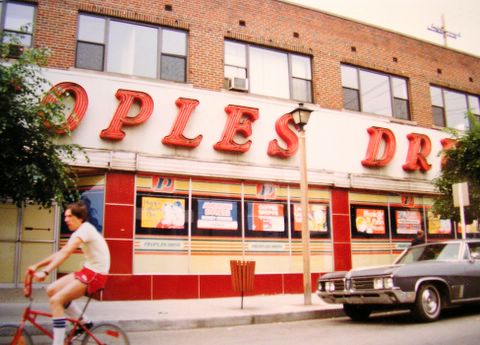 The first day at my first job was both scary and exciting. I really only applied at two places. The first was an ice cream shop, where the assistmant manager fawned over me and had me filling out new employee paperwork until he found out I was only sixteen not old enough to work at his store. Amazingly, he called me two years later, the day I turned 18, and offered me a job.
The first day at my first job was both scary and exciting. I really only applied at two places. The first was an ice cream shop, where the assistmant manager fawned over me and had me filling out new employee paperwork until he found out I was only sixteen not old enough to work at his store. Amazingly, he called me two years later, the day I turned 18, and offered me a job.
I walked into the People's Drug Store in the 7-Corners Shopping Center [upper left of image] and noticed a "Help Wanted" sign on the fountain counter. While I didn't want to work with food, I did want a job, and applied. Luckily, I talked to Mr. Groux, the assistant manager over the floor, and he hired me before I could talk to Mr. Tribbe, the fountain manager. I still remember his exact words. "So, do you have any experience?" No I said. "Well, OK, you're hired." Just like that.
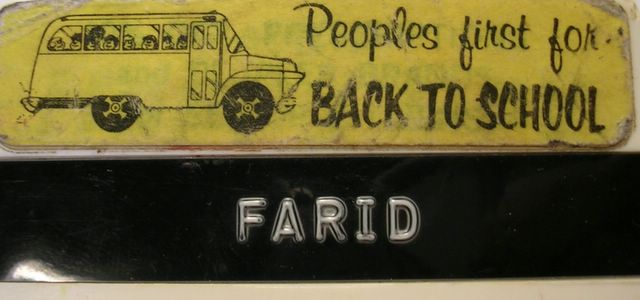 I worked at People's from 1972-1974 as a clerk, and again from 1976-1977 as an assistant manager. I enjoyed my time with the company. I made a lot of friends and got a long well with the managers.
I worked at People's from 1972-1974 as a clerk, and again from 1976-1977 as an assistant manager. I enjoyed my time with the company. I made a lot of friends and got a long well with the managers.
Mr. Shoup eventually moved to South Carolina and bought a Western Auto Franchise. Mr. Groux and Steve Stacks both became store managers with People's. Mr. Tribbe remained an assistant at the 7-Corner's store. I left for good in 1978 when I joined the Air Force. The company was eventually gobbled up by Rite Aid.
Off all the jobs I've held, People's Drug was one of my favorites.
Not All Of The Middle East Is Sand

Many people believe all of the Middle East is sun and shifting sands, with covered women and men wearing white flowing robes. Not so. This picture was taken by my father in July, 1959. It is from our balcony looking out towards the Mediterranean Sea. Notice that this could be anywhere in the western world. Beirut was a very cosmopolitan city with all cultures welcomed and respected.
We would spend the mornings swimming in the ocean, and then drive an hour into the mountains and go skiing in the afternoons. Beirut was an amazing city. It offered the best of dozens of cultures and was a stopping off point for all people of the world. I drank Pepsi, ate Betty Crocker pancakes and sipped Lipton Tea in the evening.
Do I miss Beirut? I miss the city of my youth, a city that had so much to see and so much to do. I miss the respect for all, and I mean all faiths and cultures. I remember Jews and Arabs playing backgammon in the parks -- those things mattered little then. But 3 decades of civil war has changed Beirut into a city that I don't recognize. Maybe one day I'll return when it's safe. After all, I am an American now, and not an Arab or someone from the region. I don't want to be a target.e
3 decades of civil war has changed Beirut into a city that I don't recognize. Maybe one day I'll return when it's safe. After all, I am an American now, and not an Arab or someone from the region. I don't want to be a target.e
Don't get me wrong, I am proud to be an American today. Although I embrace my past, my loyalty belongs to this great country, The United States. But part of who I am was created while living in Beirut, and I am very thankful for that.ountains and go
Man, This Boy Used To Clean Up Real Good!
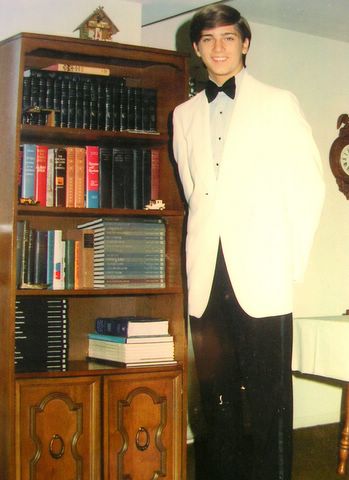 Ah, Junior Prom, 1973. The steady girlfriend I had through all of my Junior year, Amber Day of Falls Church High School, dropped me just a few weeks before the prom. I hadn't dated a girl at my high school for two years.
Ah, Junior Prom, 1973. The steady girlfriend I had through all of my Junior year, Amber Day of Falls Church High School, dropped me just a few weeks before the prom. I hadn't dated a girl at my high school for two years.I created a short list of two or three girls, and finally asked a girl by the name of [you're not going to believe this] Fish Gill. Marguriette [Fish] Gill was A fresman who lived at the Chateaux Apartments near the 7-corners Shopping Center. We were friends, and had no "feelings" for one another. I didn't want to stay home, and she wanted to be the only freshman at the prom. It worked out well for both of us.
I hardly remember a thing about the night. I have no clue where we ate dinner, and the prom itself was at something like an Eagles Lodge. I took her home and she gave me a quick kiss and that was that.
It beat sitting home and watching Sanford and Son, but just barely.
The Things We Do For Parents
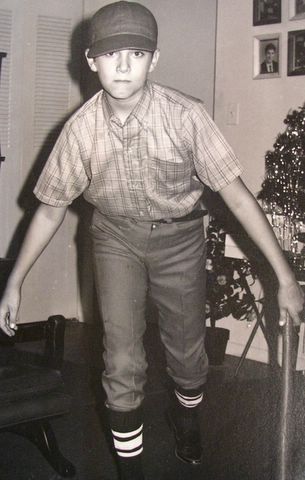 Oh, How Embarrassing
Oh, How EmbarrassingNow, I have to admit that I probably goaded my Dad into taking this picture, but hey, he's the adult and should have realized it was a bad idea. Oh well.
This was taken in our apartment in the Barcroft Towers, next to Munson Hill Apartments on Arlington Blvd in Falls Church. It was Christmas, 1968. It was our second Christmas without my Mom, who died suddenly at the age of 40 in February, 1967. Take a look at the small, sad looking Christmas tree behind me. That was about the size of those first few Christmas seasons while our family was in morning.
I guess I'm supposed to be leaving the batters box after whacking the ball into centerfield, and my Dad's camera froze me in some kind of stop-action silliness. Cool in 1968. Very embarrassing in 2005. Notice the lack of any logos or team designs anywhere. That just wasn't around in 1968 I never owned a Washington Senators cap; I don't think any of my friends did either. You couldn't buy the real thing at the store, and no one carried the replicas. That hat I'm wearing came from Drug Fair. It was bright red and the closest thing I could find to a Nats cap.
With my luck, I was probably thrown out at first base.
A Family Affair
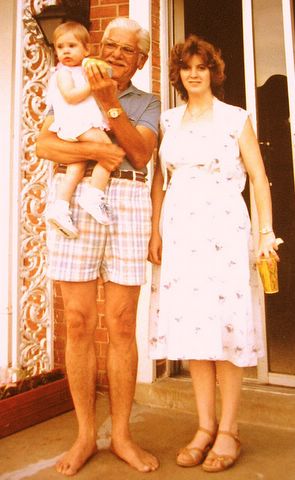 Dad and I never got over our problems. Ask me what happened, and you'll get a different answer from what my brothers might say. I think all the problems were based on his absolute love for his wife, my mother, and after her death, I was the only thing on Earth that reminded him of her, and that really, truly hurt him. Sure, I did some dumb things, but nothing so bad as to be asked to leave the house. Twice. I never did drugs. I didn't drink. I wasn't a member of some anti "something" group. No. I was just a kid searching to find himself. But for whatever reason, I didn't do it in a way that satisfied my Father. I regret those things I may have done, but I am not sure at this point in my life what those were, other than perhaps being an immature 18 and 19 year old.
Dad and I never got over our problems. Ask me what happened, and you'll get a different answer from what my brothers might say. I think all the problems were based on his absolute love for his wife, my mother, and after her death, I was the only thing on Earth that reminded him of her, and that really, truly hurt him. Sure, I did some dumb things, but nothing so bad as to be asked to leave the house. Twice. I never did drugs. I didn't drink. I wasn't a member of some anti "something" group. No. I was just a kid searching to find himself. But for whatever reason, I didn't do it in a way that satisfied my Father. I regret those things I may have done, but I am not sure at this point in my life what those were, other than perhaps being an immature 18 and 19 year old.It had been several years since I moved away from Virginia, and it was very difficult to see my Dad again. It was the same for him. Until the day he died in 1986, he never was able to treat me as just "one of his boys." But he wanted to. He gave my wife Tracey and my daughter Kira all the love they wanted, and then some. He took them on long drives in the mountains, and gave them beautiful gifts. Me. Me he couldn't look in the eyes.
I miss my Father -- he has been gone almost 20 years now. I wish something could have been done to make our last years together more enjoyable for both of us, but it is too late. I still love him, and wish that things could have been different.
The Look Of The 1970s -- PLEASE GO AWAY!
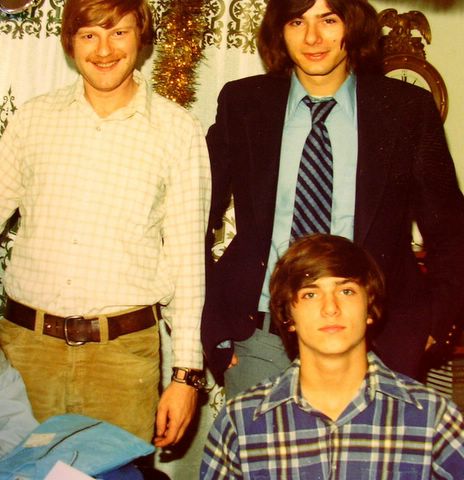 The 1970s -- yuck
The 1970s -- yuckHow in the world did we think we looked good in these clothes and that hair??
This photograph was taken on my 16th birthday [May 28 1972], with my brothers Tim [left] and Sharif [behind me] there to support me. Tim worked in computers for a bank at the time, and Sharif managed a Bonds Clothing store in suburban Maryland. My father took the picture.
We were living in Woodlake Towers at the time, on Arlington Blvd. just down from Seven Corners.
A Relaxing Saturday, 1980 Style
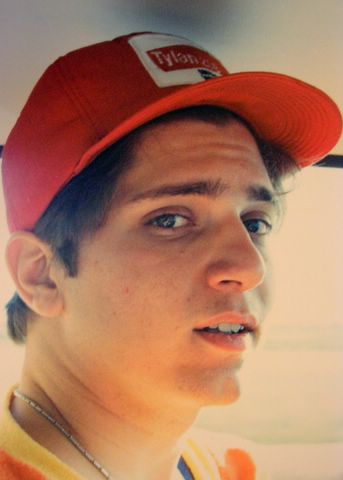 Oh gosh, I was so young. This picture was taken driving along Interstate 15, somewhere between Ogden and Layton. Most Saturdays, Tracey and I would drive to her parent's house and spend a few hours there. The hat says "Tylan," which was a drug sold to veterinarians. I was working at the time for Interwest Vet Supply in Ogden.
Oh gosh, I was so young. This picture was taken driving along Interstate 15, somewhere between Ogden and Layton. Most Saturdays, Tracey and I would drive to her parent's house and spend a few hours there. The hat says "Tylan," which was a drug sold to veterinarians. I was working at the time for Interwest Vet Supply in Ogden.Tracey had returned from Naval basic training in Orlando a few months before, and new plans had to be made. I was going to go back to college while Tracey served as a Physicians Assistant in the Navy, but they found her ear problems just before she concluded her basic training, and was released from duty.
In another month, I would find a job in the accounting department at Zions Bank in Salt Lake City. We moved form a somewhat rundown home in Ogden to a beautiful apartment in Salt Lake City, near Trolley Square. That was one of the happier times in my life.
View From Our Back Door, 1959
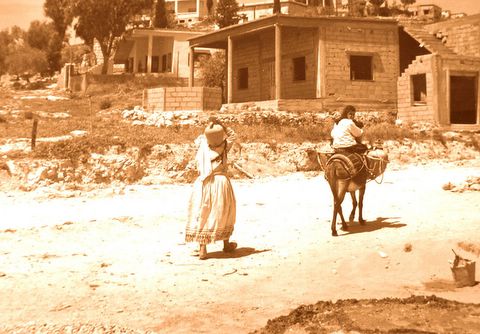
My Backyard in Beirut [circa 1959]
I lived in a apartment house in Beirut. It faced the Mediterranean sea [I can't remember how close it was to the ocean] and the picture above shows the back yard. The coastline of Beirut looked very much like any other large, cosmopolitin city in Europe. But once you began to take the back roads however, it had a taste and feel of the backwardness of the Middle East of that time.
I remember that the women didn't like having their pictures taken; my Father would have to hide and snap his shutter before they could react. See the woman who just noticed my Father? She wasn't too happy with him.
Mazda GLC: "It's a Great Little Car"
 Tracey and I had been married three weeks when we decided to look for a new car. I can't say that I remember why we did this. We didn't have a lot of money, and we had a good, reliable car.
Tracey and I had been married three weeks when we decided to look for a new car. I can't say that I remember why we did this. We didn't have a lot of money, and we had a good, reliable car.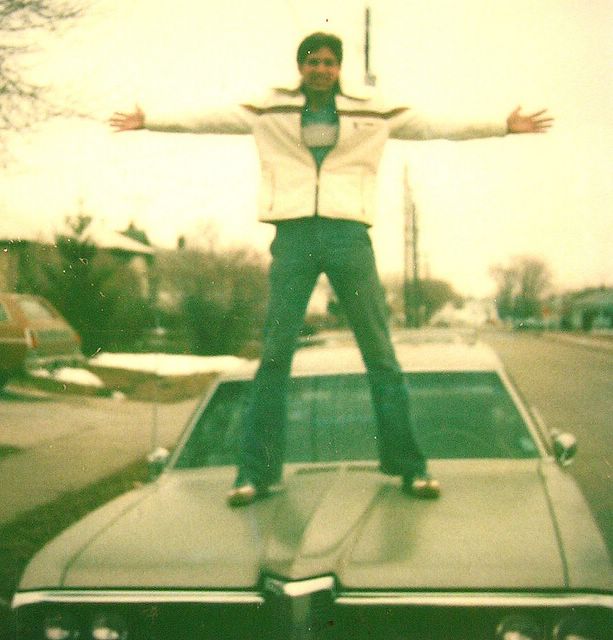
Our 1967 Pontiac Catalina stationwagon got us around quite nicely. No, it wasn't brand new, and yes, it was a little warn, but it was clean and should have lasted us for several years. We just couldn't wait, I guess.
We were driving down Riverdale Road in Ogden Utah one day and saw the new Mazda GLC[GLC meant Great Little Car] at Cutrubus Motors. At this point, Honda was THE small car in the United States, and Mazda was trying to make inroads. Tracey liked a yellow one, but it was a very basic model. This brown one had everything you could put on a GLC. The cost: $3,875. We couldn't get credit because we were still very young, but Tracey's Uncle Nolan co-signed. Interest rates were very high, and the two loans [one for the car, one for the down payment] totaled $168/mo, a great deal in 1979.
No regrets. The car gave us safe and reliable transportation. We went to Seattle to visit Tracey's family, who had just moved there from Layton. Tracey's parents had to go to Boston to visit family, and they took our little Mazda. It survived many years. It moved us to Seattle, then to Washington, D.C. Later, it took us to Ann Arbor Michigan, St. Louis Missouri and West Palm Beach, Florida. By the late 1980s, it had begun to show its age. It needed a new radiator, but we couldn't afford one. We once had to travel from Tampa Bay to West Palm Beach during the middle of August. The only way to keep the car from overheating was to turn on the heater full blast [which drew some of the heat off the engine and into the car]. That was a long, HOT trip across Alligator Alley! We gave the car to Tracey's family, and David ended up wrecking it on a rainy highway.
It gave us good, reliable transportation. It also turned out to be the only brand new car we ever bought.
Beirut As I Remember Her
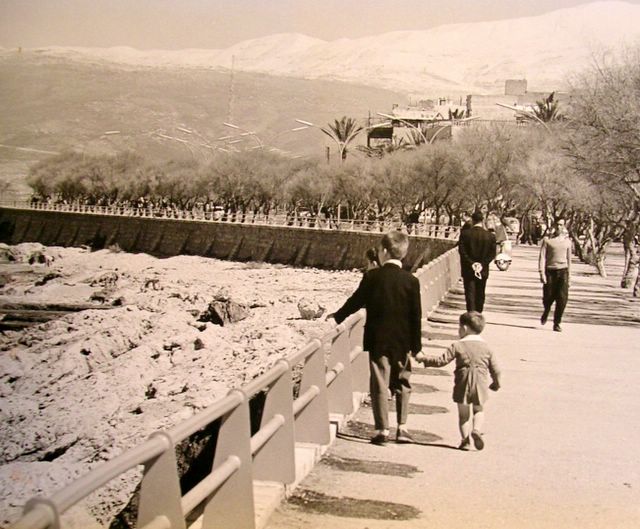 I was three years old when we left Beirut Lebanon for Washington, D.C. While most of the memories are cloudy, a few distinct remembrances remain to this day, some 46 years later.
I was three years old when we left Beirut Lebanon for Washington, D.C. While most of the memories are cloudy, a few distinct remembrances remain to this day, some 46 years later.
We lived in an apartment house right on the Mediterranean Sea. Often, we would swim in the sea during the morning, and then after a lunch and short nap, we would head to the mountains for a day of skiing. As I remember, the trip took thirty minutes as the most. The photo above shows the close proximity between the sea and the mountains above the city.
Beirut had a cornice around the city. The cornice was a walkway that bordered the Mediterranean. In the evening, the people would put on their nice clothes and walk the cornice, enjoying the warm evening as well as the cool ocean breeze.
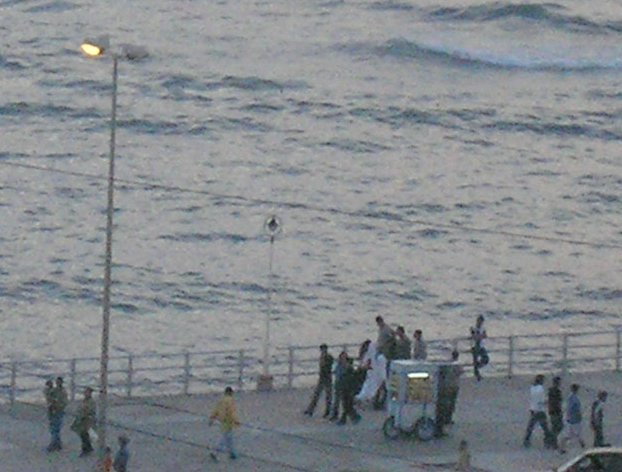 Along the way, tradesman sold their wares. a I particularly remember one peanut vendor, who would wrap his roasted peanuts in a cone made of newspaper. He had a trained monkey who was trained to take the money from the customer. The man was very old, and wore a fez hat. I'm the litle kid on the right in the above picture.
Along the way, tradesman sold their wares. a I particularly remember one peanut vendor, who would wrap his roasted peanuts in a cone made of newspaper. He had a trained monkey who was trained to take the money from the customer. The man was very old, and wore a fez hat. I'm the litle kid on the right in the above picture.
Take a look at this picture I found on another person's blog. It's a picture of that same cornice taken 45 years later. Look at the people still walking in the cool summer's eve. Look at the vendor selling his wares.
The more things change, the more they stay the same.
My, How Times Change [Or Do We?]

All In The Family
All in the Family came on to the scene in the early 1970s, and changed the way America watched television. Out was Ward and June Cleaver. In was Archie and Edith Bunker. Gone was the hand-holding, family at the dinner table sit com. The Bunkers fought, they yelled, and they sounded more like the family across the street than the Cleavers.
I enjoyed All In The Family so very much. I sided politically more often with Mike, and was uncomfortable with Archie's patriotic, flag waving ways. Man, look around you, Arch. Things arn't that good. But that was during a time when things weren't so good in America. Vietnam. Watergate. Inflation and high oil prices. No, it wasn't fun being an American.
Today, however, I side far more often with Archie. No, not that grumpy, bigoted side, but I do have today those family values that he so uniquely espoused. I think I am typical of most humans I think. At 18 or so, you tend to be more liberal, wanting to have the world and not have to pay the price for enjoying it. As you get older, you become more hard working, more dedicated and more appreciative of those in the world who carry with them a value system.
"By da way Glenn Miller played .... songs that made the hit pa-rade...."
Some Of The Happiest Days Of My Life

Basic Training in 1978
Basic training wasn't that bad. Really. I arrived on January 20th 1978, and for the next six weeks, it was like nothing else I've ever experienced.
I was the "housemouse," or my flight's version of Radar O'Reilly. I acted as the administrative assistant for the T.I., Sgt. Gannon.
Oh, How I Love Sports Photography
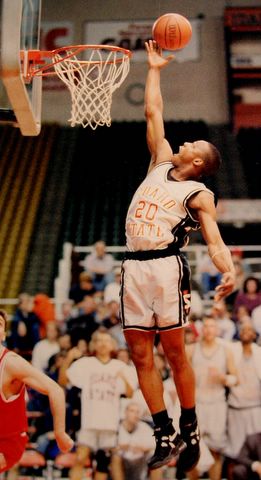 Most any person who loves photography, and who loves sports, would like nothing better than to be able to take photographs of sporting events. When you live in the "big city," however, getting noticed is very hard. When I was in high school, a sports editor for the Northern Virginia Sun came to my high school and asked for a photographer to take photographs at that nights football game. I was lucky enough to get the assignment and did the job.
Most any person who loves photography, and who loves sports, would like nothing better than to be able to take photographs of sporting events. When you live in the "big city," however, getting noticed is very hard. When I was in high school, a sports editor for the Northern Virginia Sun came to my high school and asked for a photographer to take photographs at that nights football game. I was lucky enough to get the assignment and did the job.
It was many years later that I got the opportunity to photograph big time college football. I met the new head football coach of Idaho State University, Brian McNeely, at my camera store. He needed a photographer and videographer for his team, and he gave me the job. I followed the team for five seasons, from 1992-1997. These pictures were hardest to take because of the lighting conditions and fast movement, yet football was my favorite sport to shoot. I began taking the pictures for the ISU mens basketball team the following year. In 1993, I was the photographer for the Pocatello Posse of the Pioneer league.
I made only a little bit of money, but made many wonderful and lasting memories. It was a great time for me, combining my love of sports with photography. I hope that one day I get the chance again.
The Summer of 1969
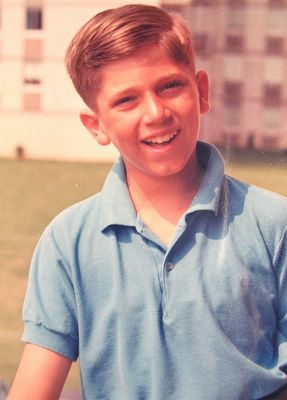 Well ... I USED to be cute. Compare this picture with the one shown in my profile. Sigh. "The times, they are a changing"
Well ... I USED to be cute. Compare this picture with the one shown in my profile. Sigh. "The times, they are a changing"
1969 was a wonderful year. I turned 13 in May, finally, officially, a teenager! My Mother had died in 1967, and that stinging, sinking feeling associated with her loss had finally begun to subside.
This photograph was taken in June, from our 6th floor apartment balcony. We lived in the Lake Barcroft apartments, just down the road from 7-corners in suburban Washington D.C. The apartment was very nice, although I had to share a bedroom with my Dad [so unfair for a 13 year old]. But we had a lot of nice amenities: swimming pool, pool and ping pong tables, weight room and sauna -- all a very big deal in 1969.
It was a great summer. I spent every afternoon at the pool [notice the tan] and every evening with my little red Toshiba transistor radio, listening to MY boys of summer, the Washington Senators. That was the one and only winning season for my team during their 10 years in D.C., making the summer even that more special.
Summer. Baseball. Swimming. And, to top it off, girls didn't seem quite as creepy as they did the previous summer.
How I View Blogging
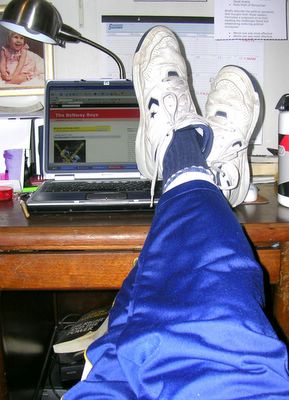
How I View Blogging
This picture reflects my view of blogging ... with my fee up on the desk. No. Seriously. Blogging is [in my view] the most important outgrowth of the internet. Sure, the internet changed how we live our lives, make our money, and see our position within the global world. But blogging has done more to change who we are as individuals. To this point, the only people who cared what we as unique humans believed were our closest friends and relatives. Now, with the blog, people we will never meet, and likely will never communicate with, are reading and analyzing our thoughts. I have five blogs that range in context from sports to politics. Right now, having been publishing less than two months, I am averaging 20+ hits per week. Where do these people come from? I have no idea. Many like what I'm saying, some strongly disagree. But a dialogue remains open between me and the rest of the world.
When I was a young man growing up in D.C., the only news I received was from the "big 3" networks and the couple of radio news networks. There was no differing opinion, no alternative ideas as to the word around me. Because the networks and newspapers usually copied themselves in character and content, and because my beliefs differed from them, I thought myself to me strange and alone in the world. Today, a single key stroke can find thousands of others who share similar values and traditions. Just like that.
Gosh, I love that.
It's An 8-Track Flashback

Oops. Don't Ask Me For Investment Advice
Many years back, oh, around 1972 I guess, I decided to save up and by a tape player for my '68 Olds 442. I went to the local Montgomery Wards, and found myself having to make a choice. I could get one of two different systems, both new and relatively untried. I could get the "cassette" system or the "8 track" system. Hmmmm. Let me think. The cassette tape is about 1/10th the size of the 8 track, and plays about 45 minutes per side. The 8 track has to switch from track to track as the tape loop ends, causing a really loud "clunk" noise. Often, this "clunk" comes in the middle of the song. "Bye bye, Miss American pie, drove my Chevy to the" *CLUNK* "levy but the levy was dry." The 8 tracks were a little more expensive [$4.77 at Harmony Hut near 7 Corners shopping center." Hmmmmm. "I'll take the 8 track please" I said to the sales guy. Within three years, 8 track system were no longer made, and cassette tapes continued well into the mid 1990s. So, never, never gamble on my predictions.



